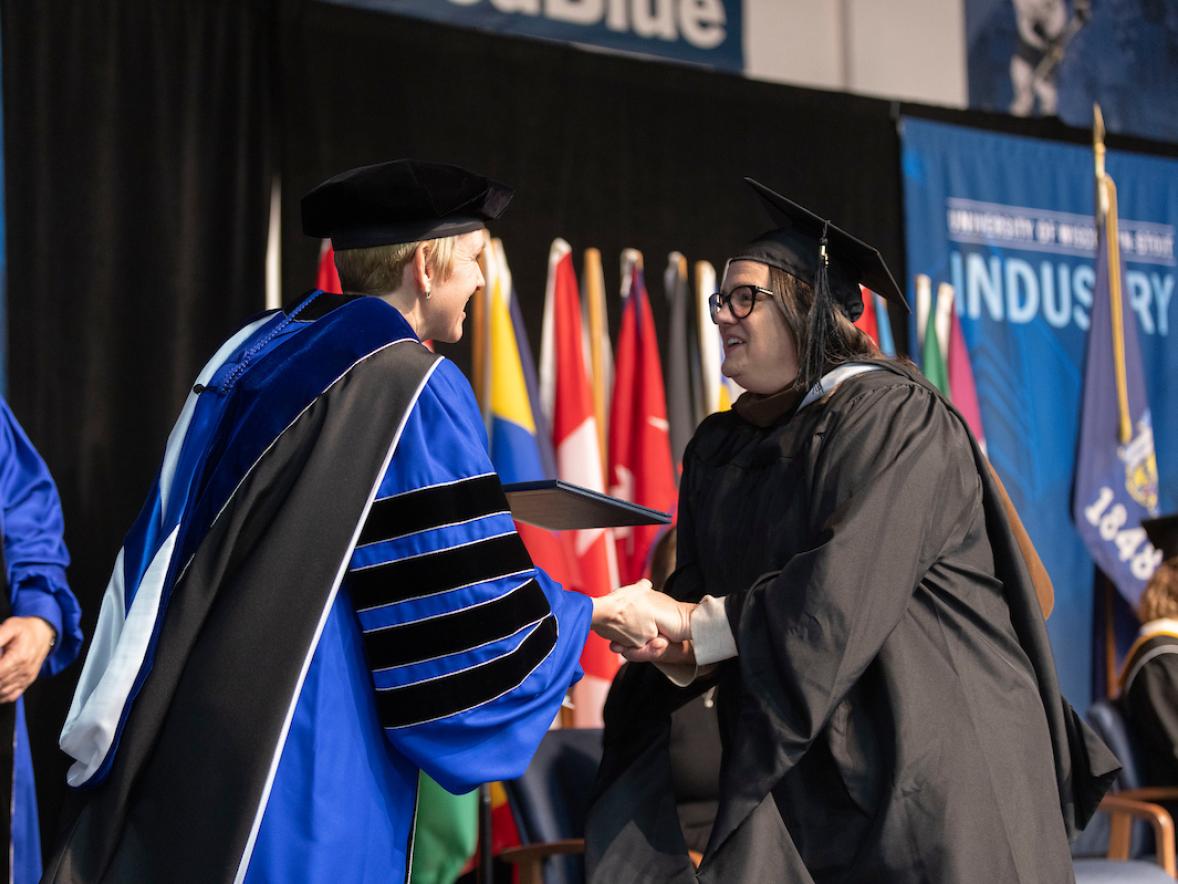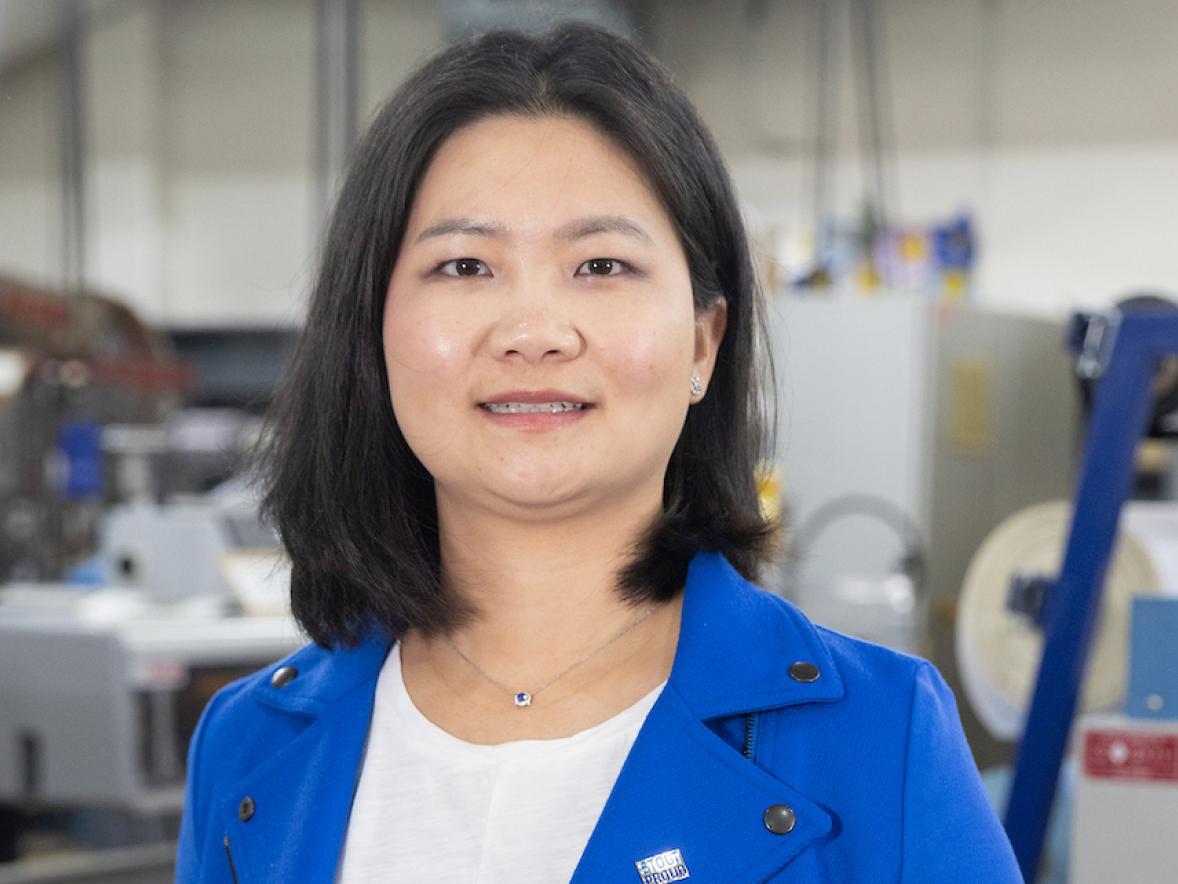The Manufacturing Outreach Center at UW-Stout is focused on helping small manufacturers around the region improve their operations and become more successful.
In 2020, however, the center was limited by COVID-19: Employees couldn’t go to work sites to help train companies in the proven, industry-leading method of Lean manufacturing.
That’s when engineer Ted Theyerl, inspired by seeing one of his sons engaged in the video game Rocket League, turned the center’s philosophy outside-in and wondered: Could the Manufacturing Outreach Center improve its own process and teach Lean manufacturing digitally?
“It was a unique opportunity to collaborate with the resources we have at UW-Stout,” Theyerl said.
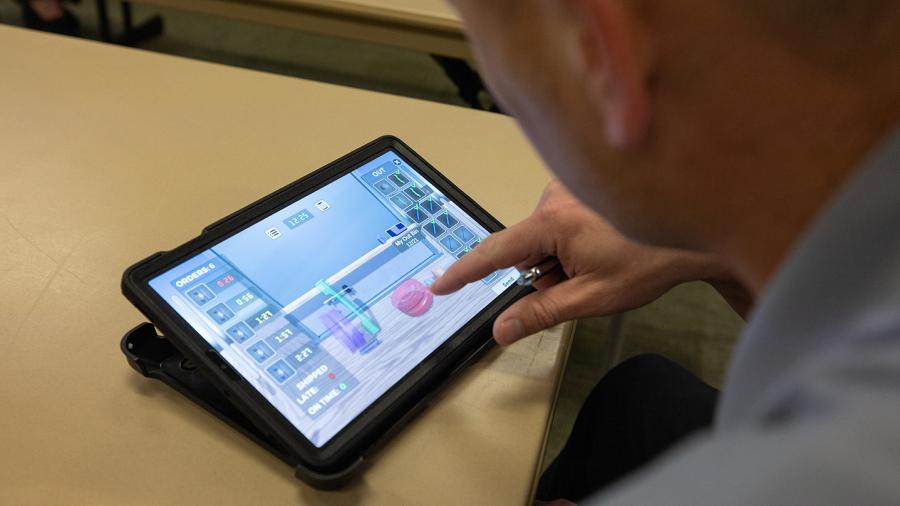
He approached Associate Professor Andrew Williams, director of the nationally ranked game design and development-art program, who agreed. They began a partnership to bring Lean instruction into the digital age.
About 1½ years later, thanks to the skills of six students doing the work and with a state and federal grant, the center has a new, more interactive and potentially effective tool: Buzz Digital: A Lean Manufacturing Simulation.
With COVID-19 impacts waning, center staff is returning to in-person visits to manufacturing clients, but Buzz Digital is on the forefront nationally of a whole new way to teach Lean, Theyerl said.
Traditionally, Lean has been taught using objects, such as Lego bricks, to show workers how to streamline manufacturing operations. Buzz Digital is a software-based program in which the objects and process of moving the objects along a production line are simulated on a touch screen tablet and passed on to other work stations in a game-like experience.
In early test sessions, Manufacturing Outreach Center “clients who have experienced both types seem to like the digital version better,” Theyerl said.
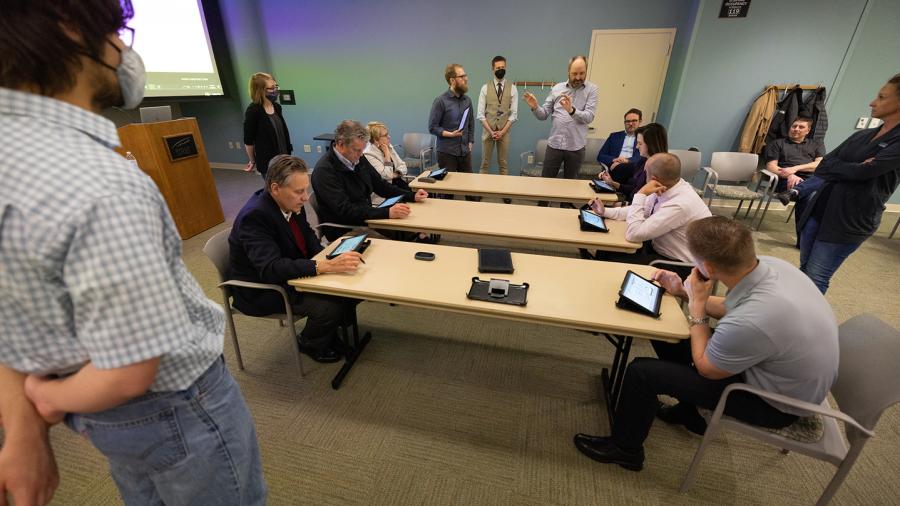
Buzz Digital isn’t fully web-based yet, but Theyerl’s vision has been achieved in that it can be operated remotely. Six tablets are shipped to a client, who is provided a mobile hotspot to operate the program and gather metrics. Set-up takes five minutes or less. A remote or in-person facilitator then oversees the simulation.
Officials play-test Buzz Digital
Recently, as the spring semester wrapped up at UW-Stout, the Manufacturing Outreach Center and game design program held a demonstration, with Chancellor Katherine Frank and industry partners testing Buzz Digital in the Memorial Student Center.
The result? “This is engaging and you can really see a path forward. It’s something that’s now useful and usable. You did a great job with it,” Buckley Brinkman told students who oversaw production of Buzz Digital.
Brinkman is president of the Wisconsin Center for Manufacturing and Productivity. Representatives from two companies, Andersen Windows and Culimeta-Saveguard, and other university officials also attended.
Six people with tablets, each with different assigned tasks, logged into the program and teamed up to make and ship science-fiction inspired canisters. With some coaching from Theyerl, Williams and the student team, the participants quickly assessed how to use the program, using touch screens to drag parts from one site to another.
In the first round of the simulation, however, no parts were shipped after 15 minutes because an inefficient work process clogged the system. The person at the end of the production line, shipping, did nothing. One of the eight wastes eliminated through Lean is waiting.
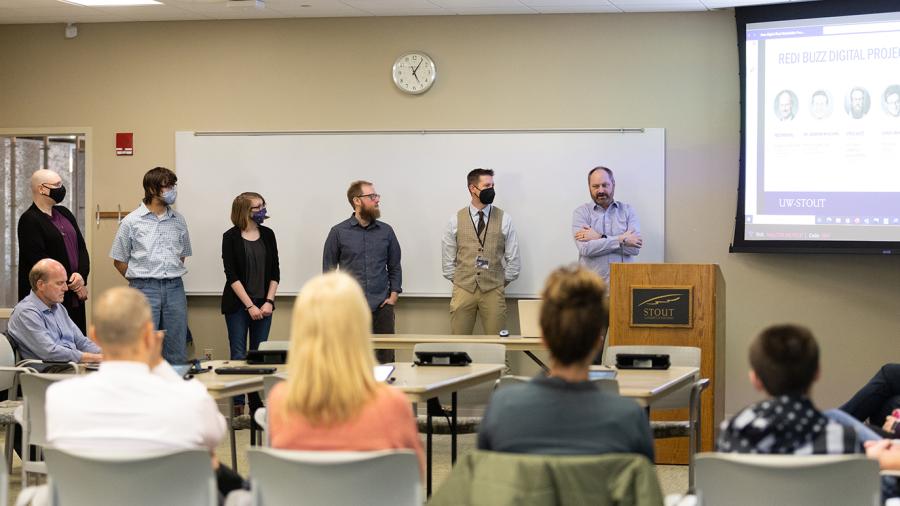
By the third round of the simulation, Lean principles were employed, balancing the work time between stations and reducing the batch size. Idle workers were no longer idle and contributed to the manufacturing process. The team shipped a part in one minute and four parts within a few minutes.
Buzz Digital users get performance metrics after each round to help them assess how to improve the process.
Students learned as they built Buzz Digital
Students created an educational program that operates like a video game, an application of the game design major that has led many graduates to jobs in business and industry, such as creating simulations in the health care field.
Using open source software, they built the simulation from scratch, first envisioning how it might play, look and sound and then bringing those aspects to life while remaining true to teaching Lean principles.
The process included rigorous user experience testing, including for such things as color blindness and user accessibility, Williams said.
Six students, some for shorter periods than others, worked on the project:
- Steve Datz, of Grafton, a senior computer science major
- Jose Estrada, of Miami, Fla., who graduated in 2021 in game design and development-art
- Zach Gross, of Whitewater, a senior computer science major
- Darcy Hannen, of Chippewa Falls, Master of Fine Arts in design
- Simon Meyer, of Mound, Minn., a senior game design and development-art major
- Lillian Sommer, of New London, a junior computer science major
Hannen oversaw artwork and user experience testing for Buzz Digital. User experience is the focus of Hannen’s MFA studies.
“It was a huge undertaking. For a while it was just Steve and I, he as the lead programmer and me as a designer. We had discussions every day,” said Hannen, who worked up to 25 hours a week on the project. “I would run a test and have to analyze it.”
Hannen learned new skills related to game engines and adapting Agile design thinking to the Lean process.
As they worked on Buzz Digital, students presented the concept at a manufacturing conference and in 2021 to the UW System Board of Regents. “We kept realizing how big it was as it went along,” Hannen said.
Sommer, who is focusing on game design in the computer science program, was a game-play programmer who implemented new features based on Hannen’s testing results.
“It was a lot more advanced than anything I’d worked on before. It put me in a situation where I needed to manage my time. We met weekly so it taught me the workplace experience of working with supervisors,” Sommer said.
She is proud that the team created something playable and educational for users who may not typically play video games.
“People who don’t have tech experience are able to find their groove and interact with it smoothly. The game design industry tends to have an issue with games that are made by people who play games, and people who don’t play games are left out of that. A huge part of the project is minimizing confusion. We did our best to try and eliminate that,” Sommer said.
Work will continue on Buzz Digital to make it even more user friendly. For example, the program could be scaled up to include 20 players. When finalized, it could be deployed to Manufacturing Extension Partnership centers, like UW-Stout’s, around the country.
The Manufacturing Outreach Center used most of an $88,000 online services delivery grant for the project. The grant was through the WCMP, National Institute of Standards and Technology, and MEP Emergency Assistance Program.
UW-Stout’s manufacturing center is part of the Discovery Center, the university’s primary outreach and engagement organization.
###





